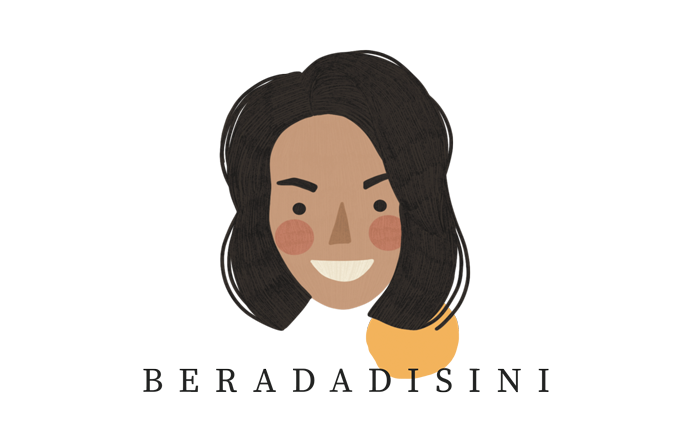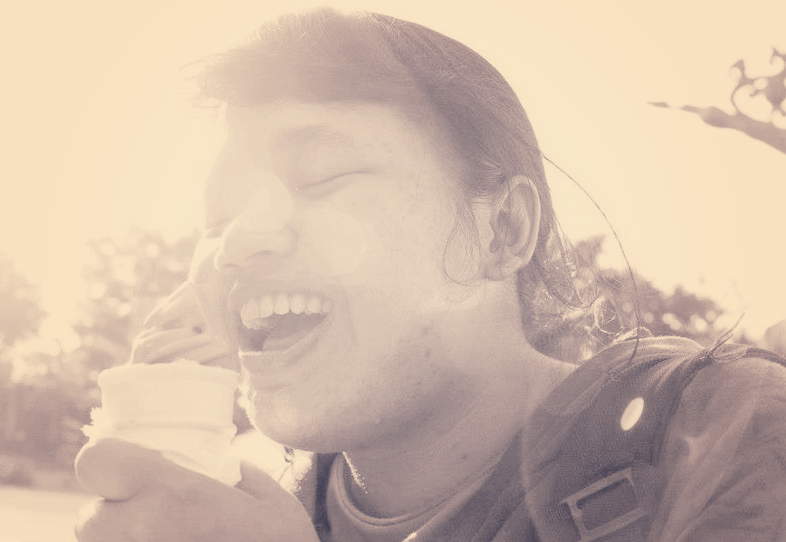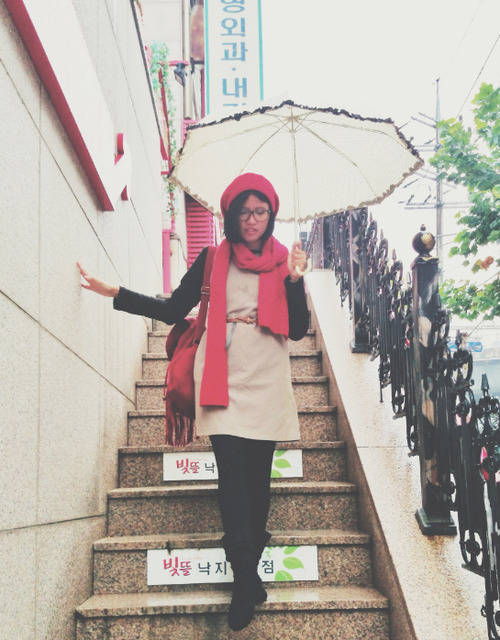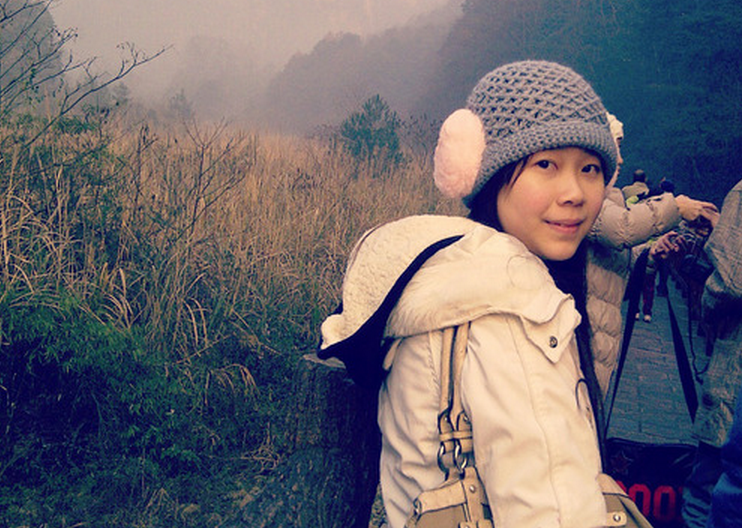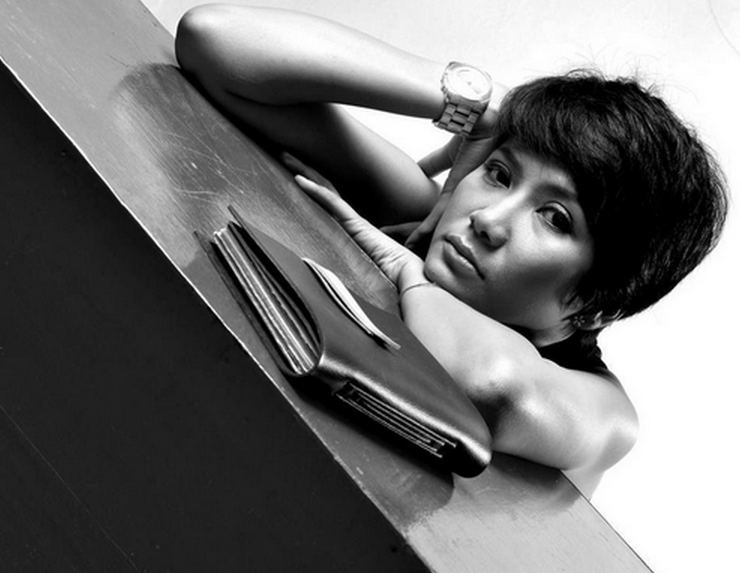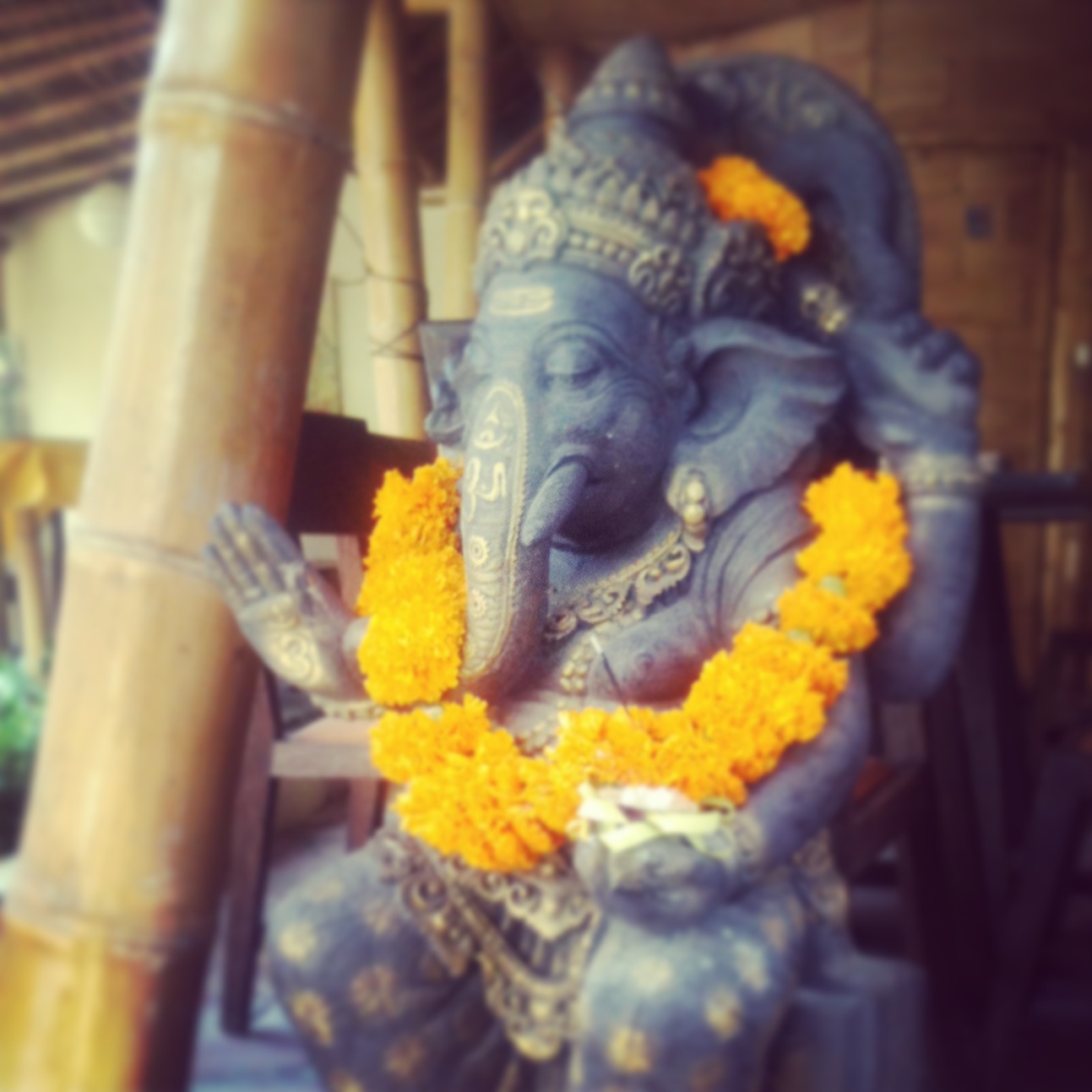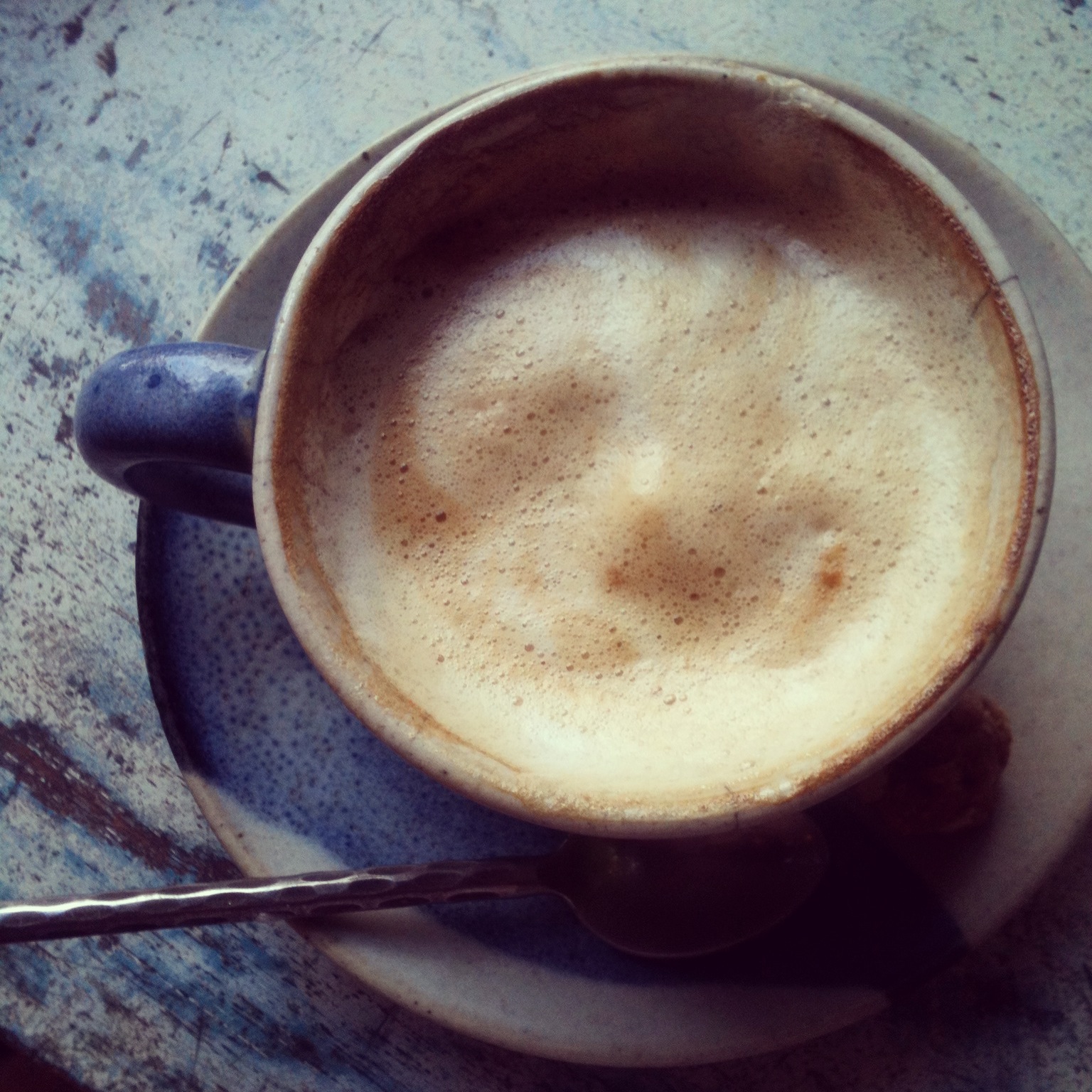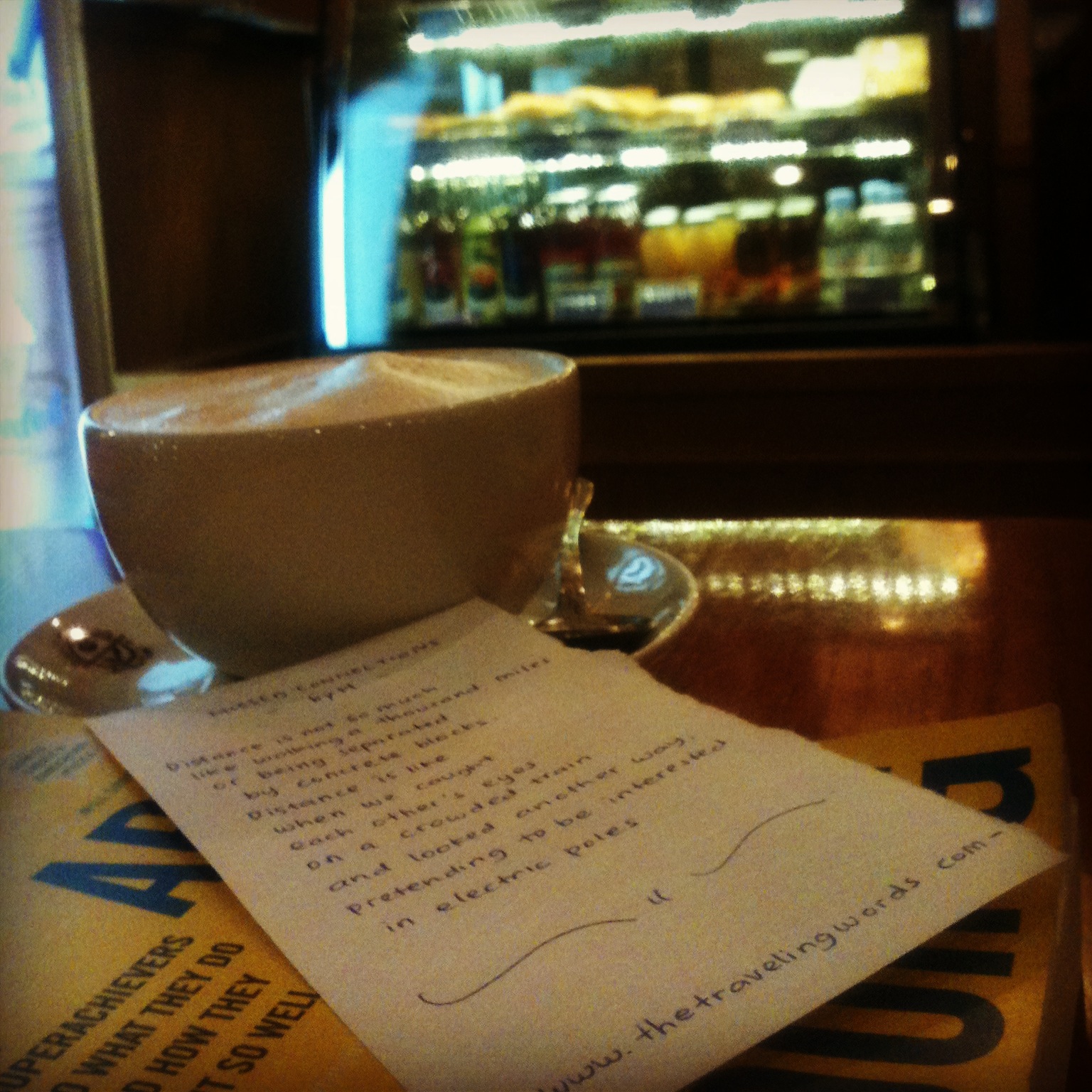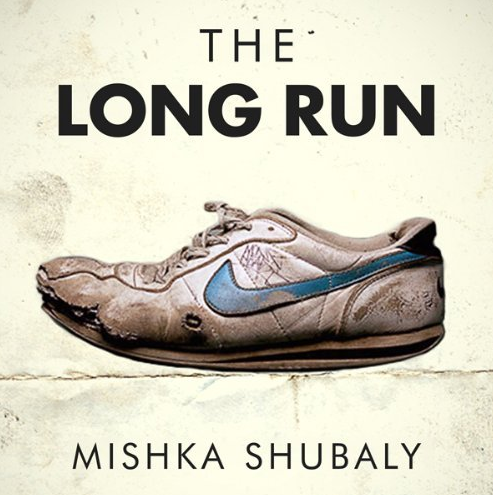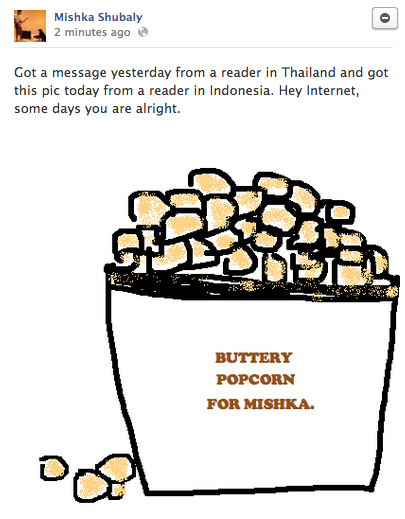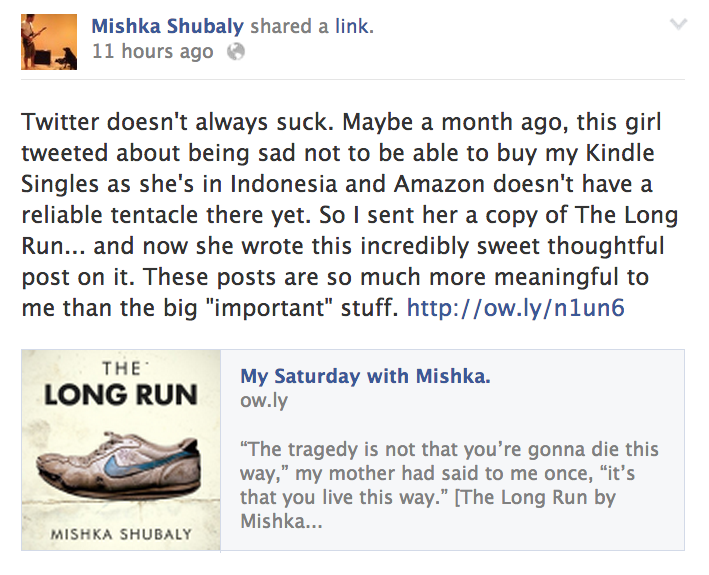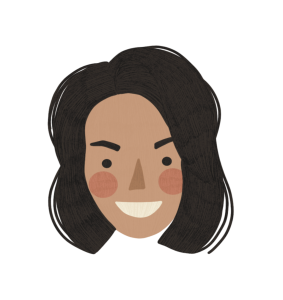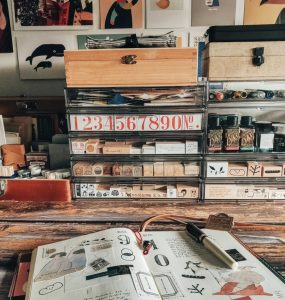Dewi Kharisma Michellia‘s stories had been published in several Indonesia’s respected newspapers, such as Koran Tempo, Jawa Pos, Jakartabeat, Media Indonesia, and many more. Some of her short stories can be downloaded here. Her novel, Surat Panjang Tentang Jarak Kita yang Jutaan Tahun Cahaya (Long Letters About Our Distance That Spans A Million Light Years) won the novel-writing competition held by Dewan Kesenian Jakarta (Jakarta’s Art Council) in 2012. You can read more interviews with Indonesian writers here.
What made you start writing? What can you remember from those days?
Michel: I want to have friends.
As an only child with busy parents who would only came home near the breaking of dawn, oftentimes, I only befriended the mirror. My grandmother always persuaded me to go to sleep, telling me that I didn’t need to wait for my parents. She did it by serenading songs about frogs. Those songs told stories.
Since then, sometimes when my parents were at home, I would ask them to tell me stories. My father would prefer wayang stories, while my mother adored East Asian stories.
Their customs of telling stories ended the day I could read. My grandfather taught me how to write the alphabets on our house’s terrace, and I read those letters when I was 4. The next day, my parents bought me a huge-sized legend storybook. They did not allow me to buy comics.
But I guessed I learned a lot about dialogues from the comics I borrowed from the reading garden.
Suzue Miuchi neatly told a story of the Japanese legend Amaterasu, Izanagi, and Izanami. Also, Topeng Kaca (Glass Mask), about a girl’s struggle to pursue her dream as a theatrical actress. There was Candy Candy from Yumiko Igarashii, portraying juvenile’s cheerfulness, and the ups and downs of their lives. I learned writing complex stories from them, as well as from R.A. Kosasih’s graphic stories of Mahabharata and Bharatayudha.
I am pretty sure that my love for those childhood readings made me have the courage to write my first short story, although later on, my first story was triggered by something very trivial. I had been writing a lot of poems since my last years in elementary school, but
I started writing prose when I was in my second year in junior high. The reason was really inconsequential. At the time, my classmate wrote a short story on the back pages of her book, because she was bored in Math class. Her stories were so much liked. I also experienced similar boredom when it comes to school, so I did the same thing, although my short story didn’t circulate as hers.
When I first started, I wrote every day. I liked to compete with time.
On the first day, I remembered that to write 3 pages of short story, I needed to contemplate in front of the computer for more than a day. The next day, to write 6 pages, I needed only 6 hours. The peak of my achievement, when it comes to timing, I could write 3,000 words in 2 hours.
However, considerations on the quality of my writings had only kicked in when I enrolled to a writing site, Kemudian.com. Finding the site was like finding treasures. Someone in that site supported me to go to college in Yogyakarta, learn English more diligently, and read more.
In Yogya(karta), everything developed so rapidly. My writing skills were totally sharpened in the campus press community I participated in. Before, I had never thought that a really good writing came from tenths of editing process. To write one article that is worth publishing–and still, being evaluated as a bad writing by our seniors–I needed to sleep over for days to see my writing being edited. It happened for 2 years. We’re not only competing with speed, data accuracy, and choices of perspectives, but also needed to know how to write something with novelty.
Although it seems like I am real tough in facing my writing routines, I consider my process of creation resembling Paul Cezanne’s story, that was written by Malcolm Gladwell in “Late Bloomers”.
I spend too much time to repeatedly feel frustrated and stop. The last time, I took a vacation from writing fiction for one full year.
And although I realise this tendency, still I am always haunted by doubts. If I count how many times I complain about how I feel so tired and bored dabbling in fiction writing, until I’m reaching 22 today, I think the amount reach hundreds. However, I have never felt afraid that my writings are not worth printing or publishing.
Because in every piece of work, I dedicate it only to a certain amount of people.
If there are at least 3 things that become the signature of your writings, what are those things? Why do you think they repeatedly appear in your works?
Michel: Death, dream, and madness.
Death, since my mother was diagnosed with cancer. At the time I was in my second year in junior high, and I started to write with the theme of cancer-inflicted death. It became stronger after my mother actually passed away when I was in my last year in high school.
The day when Mother died was such an impossible day for me.
As a fiction writer, I laughed at myself, who had had random thoughts about my mother’s death. That evening, it was as if my life had turned into metafiction. It wasn’t clear which was real and which was not.
I saw myself as a fiction character who didn’t know how to face such plot, and whether I could negotiate with the writer to, for instance, resurrect Mother from the death. Thus far, Mother had became a single parent, there were only two of us left, and without Mother, I felt like I would live alone.
That moment stuck within me, how I cried in front of the hospital room when I saw that the room was empty, how I felt as if I wouldn’t be able to continue living without Mother. Since then, I decided to dedicate my appeal towards Mother’s death to each dead character in my fiction.
Others may not be to keen on occultism and parapsychology, unlike me. Well, actually I am not that keen as well, but for some reasons, I really like mystical things. Dream, some dreams took me to the future and made me experiencing numerous deja vu. I solve complicated problems in my dreams, have the ability to fly and walk through walls. Meet giants. Do things I have never had the courage to do in real life.
I really like mystical and magical stories, and I feel those stories just like a dream.
Madness, this term can never describe the real situation accurately. Because from my life’s experience, I see people who are considered mad being isolated from their environment. But where is this coming from?
How righteous are we to stick the “madness” label on them? And then after we concluded that they are mad, how can we feel like we have the right to destroy their lives by injecting them with medicines or electrocuting their brains?
Or how is it possible that nobody asks those mad people on the street, about what made them end up homeless, or what made them feel so empty about their lives?
Sometimes, when it’s not about madness, I will choose to write about those who end their lives with suicides.
Stories of people who are committing suicides are often times being told with sneers and mockeries. I do not want to capture it that way, because I respect each individual’s freedom of choice.
To me, suicide is like a patent-right staff who has to work for years without being allowed to come up with the relativity theory. There are people who face dead-end in their lives when life is not supposed to end.
Those who do not understand this do not have the right to judge.
The time when you read a book and finished it, and then you mumbled to yourself, “Wow, that was a good one!” – what made you say that?
Michel: Books with hilarity, as if the writer has just tried to scream the word NO to Solomon’s sayings about “There’s nothing new under the sun” throughout the writing of the book. He should be a writer who gets bored easily and does not want to get stuck with someone else’s works, or even gets burdened with his previous works.
I want to find a different perspective, entering a fiction-world that seems real, even to an extreme point. As I finished reading it, I want to be made into someone new, without feeling that I have changed.
Since I have always been interested in complex and rounded character, I tend to like transgressive fictions. Works that exhibits lives’ wounds. Characters that are complex and interesting usually come from an unusual background. There are a lot of unpredictable things in their daily lives. Usually they are free-minded and witty, and probably because of that, they are gifted with more life’s challenges from their writers (to not blaming God) or probably it is because of those life’s challenges that they possess such witty characters.
I like works that show how witty the writer is in executing his works. To me, that’s what literature has to offer. Breakthrough. Freedom.
Not being imprisoned in a certain pattern. Other things can be done in nonfiction or journalistic works. I like smart writers. They give fresh works. The character doesn’t have to be widely knowledgable and the writer doesn’t have to do name droppings. Those kind of works are supposed to offer different things to us every time we reread them.
Do you like writing long letters? I asked this because of the title of your novel. Are there certain memories related to writing long letters?
Michel: Actually, it’s not because I love writing letters. Rather than letters or epistolary genre, it can be said that I wrote Surat Panjang (the novel) because I like telling stories in metafictional ways.
Someone delivered stories from the character “I” whose life seems like an alternate history. The character was present in the 1998 incident, knew H.B. Jassin or Yusi Avianto Pareanom that was being mentioned in the letters.
The novel Surat Panjang started as a short story I wrote as a small birthday gift for myself.
All these times, I imagined that my first novel would be published posthumously. My breath is short, although my imagination is complex, so short story is the right medium for me. Until suddenly I decided to participate in a novel-writing competition held by Jakarta’s Art Council.
Working on Surat Panjang in 18 days (to chase the competition’s deadline) made me feel like bathing in freezing water during the whole process. I would not finish it without the pressure of a friend who wanted to see me winning this competition.
Finally, I became the winner. All in all, I enjoyed the process. Coincidentally, during the writing process of the novel, some friends were learning literary journalism genre. Thus, I applied narrative writing without dialogues.
Yes, I was naughty to write anonymous resources in the novel, giving birth to characters with unnamed attributions.
How do your personal lives, backgrounds, and works influence your writings?
Michel: All in all, I am lucky for I have always been placed in a space that fully supports my creative process. Although sometimes, just like the other late bloomers in general, oftentimes I curse each moment, “Do I have to go through this destiny because God wants me to become a fiction writer?”
Apart from that, I grow up as someone who loves to capture moments.
I use those fictions to keep my feelings over certain moments. It soothes my wound a bit when other people do not like my works. At least, besides the fact that I only show my works specifically only to a very small circle, I know that every fiction must be special. This doesn’t mean that I sneakily transfer my life stories–I do not like that impression, because in reality, I do it because I understand how to work tactically through a fiction.
To me, a story will have a soul and live if in the story, the writer plants a part of herself on a certain time, or a part of the people around her.
What about your writing process? Do you write every day? Are you the outline-type or the spontaneous-type?
Michel: I spend more time editing rather than writing.
Often times I hear people making a fuss over craftsmanship in writing, a lot of people are complaining about it. They said, writing should be from the heart, and should not be intended as something manipulative. I guess those misguided bunch, who are fearful towards writing and editing technique, are going overboard with this.
Editing process should not make a writing becomes worse.
On the other hand, when you’re editing, a writer is given a chance to see her work from another angle. There are always two sides in creative process, just like what Peter De Vries said: “Sometimes I write drunk and revise sober, and sometimes I write sober and revise drunk. But you have to have both elements in creation — the Apollonian and the Dionysian, or spontaneity and restraint, emotion and discipline.” Anyway, this is a very famous quote and often misunderstood as a quote from Ernest Hemingway.
When it comes to writing process itself, when I was learning at the beginning, I was very diligent in making writing outlines, along with characterisation (each character has full name, family background, zodiac, as well as references on favourite and less favourite things), but all those writings never succeed. So, after that, I decided that most of my writings do not begin with an outline.
I start my story from the first sentence. Sometimes, I only write that one sentence and just keep it for a long time.
I will only get back to it other times. Since joining the campus press, I do not write fiction every day. My time gets divided by writing nonfiction (news). Lately, I also have to divide my time to finish office works (editing and translating).
In essence, I do not see writing fiction as a must. And I also won’t take it easy as simply a hobby.
Lately, I only have time on weekends to write and read fiction. My working days are consumed by doing research for fiction and reading nonfiction. I don’t know, one day, when I have sufficient knowledge and discipline, I may decide to write full time.
